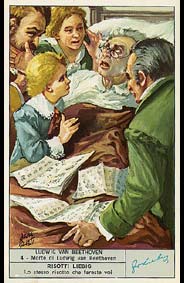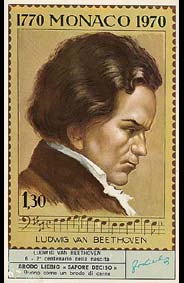|
 The
330 series of Italian Liebig cards are about
Beethoven. There are six cards. The
330 series of Italian Liebig cards are about
Beethoven. There are six cards.
Actual size of cards : 7
cm x 11 cm.
| |
|
|
1.
First
serious studies.
Of Felmish origin, Ludwig van Beethoven was born at
Bonn in 1770 where his grandfather had
moved after 1732. His father, Johan, tenor
at the Court, realised that his son had
incredible aptitude for music, and gave
him rigourous musical studies, in an attempt
at creating a child prodigy. Beethoven
was taught first of all by an oboeist,
Pleiffer, then by Christian Neefe who
gave him his first instruction in harmony
and counterpoint and intorduced him to
the music of Carl Emmanuel and Jean Sebastien
Bach. In this very young and promising
student, Neefe recognised a new Mozart.
Beethoven composed his first work in 1782
entitled "Variations on a Dresseri
march". Becoming violinist in the
court orchestra, he learned the works
of Haydn, Caldara, Pergolesi and took
an interest in Vienese and French musicians.
|
| |
2.
Improvisation in
front of Mozart.
Desiring lessons from Mozart, he went
to Vienna in 1787, but he stayed very
little time, because he had to return
to the bedside of his dying mother. Unfortunately
another blow struck him: his father lost
his familial rights due to alcoholism.
The composer therefore had to submit to
the needs of his family. However, even
if the responsibility of "Pater familias"
was heavy, Beethoven did not neglet his
studies, and in 1789, he took up philosophical
studies at the University. His friendship
with the Breuning family dates from this
period. At the beginning of 1792, thanks
to a study grant from the Count F. van
Waldstein, he returned to Vienna and took
lessons from Haydn taking with him the
phrophetic words of his benefactor: "Dear
Beethoven, you leave today for Vienna.
Mozart's genius still grieves and weeps
at the death of his possessor.. Of course,
the unstoppable Haydn has given him a
refuge, but no job. Somehow he searches
to find unity with someone new. Thanks
to working without respite, you will receive
Mozart's spirit from Haydn's hands."
His teaching was completed by Albrechtsberger
for counterpoint and by Salieri for vocal
writing.
|
|
| |
|
|
3.
Beethoven
with his student Teresa Brunswick.
Introduced into high society as a virtuoso
pianist , he gave his first concert as
pianist and composer on March 29th 1795.
He also performed, always very successfully,
at Nuremberg, Prague, Dresden and Berlin,
where he played in the presence of Frederic
Guillaume II. It was in this mundane period
of his life, that Beethoven showed violent
passion for certain students of his: Giuletta
Guicciardi, Teresa Brunswick, Bettina
Brentano, Theresa Malfatti, Amalia Sebal
and the singer Maddalena Willman. One
of these women is perhaps the "immortal
loved one" to whom Beethoven wrote
a passionate letter, found after his death.
Certainly little is known about the romantic
side of this great composers life, because
his feelings of passion did not last long,
and he never fell in love with 'appropriate'
women. His love, his succes and his triumph
did not, however, compensate for his dramatic
secret: his progressive loss of hearing.
|
| |
4.
The death of Ludwig van Beethoven.
Trapped in the solitude of
deafness, he thought of committing suicide,
but his passion for music, his desire
to be witness to human fraternity gave
him the will to live. The Heiligenstadt
Testament, written to his brothers in
1802, is at the same time an explanation
of his suffering and his force. He was
always comforted by the attentions of
his loyal friends, amongst them, the
Brunswick family, his student the Archduke
Rodolphe (later Archbishop of Olmütz),
to whom he dedicated his "Missa
solemnis", the Prince of Lichnosky,
the violonist Scuppanzich and the conductor
Schindler, his future biographer. He
died in Vienna on March 26th 1827 surrounded
by the loyal Stephan Breuning, Anton
Schindler and Sall. The funeral orasion
was read by Franz Grillparrer, a great
admiror of the musician.
|

|
| |
|
|
5.
Paladin of Liberty, Beethoven tears up
his dedication of the Eroica Symphony
written for Napolean.
Beethoven's creative works began around 1796 with
the trios opus 1 n°1, n°2, n°3, and
then the three remarkable sonatas for piano
of opus 2. In 1802 he composed his
second symphony, the ballet Prometheus,
his short but extrodinary work 54 and finally
the Third Symphony in E flat major, opus 55,
"the Eroica". The original dedication
to Napoléon Bonaparte who, at this time
represented, to Beethoven the paladin of
liberty and republican ideas, was ripped
up by the composer when he discovered that
the first counsillor had named himself Emperor
of the French. Between 1804 and 1810 the
composer's terrible fight against progressive
deafness showed itself in his works teeming
with ideas of good and justice, creating
his message of the horror of human suffering. |
| |
|
6.
Commemmorative
stamp celebrating the 200th anniversary
of Beethoven's birth.
Among his most significant
works, we remember the Fourth and the
Fifth Symphonies, Fidelio, Egmont, the
concerto for piano opus 73; after
the Fifth Symphony, a vibrante depiction
of life as a fight, comes the "Pastorale"
which signifies the triumph of inner peace,
dominating and vanquishing the contrary
forces of destiny. The Seventh Symphony
is, as Wagner said, "the pinnacle
achievement of dance", where Beethoven's
interior world wakes up, a world extraordinarily
rich in joy and light. Shortly before
dying, he composed his five last quartets
and his four last sonatas. The Missa Solemnis
and the Ninth Symphony conclude the incredible
creativity of this genius of music.
|
 |
|

